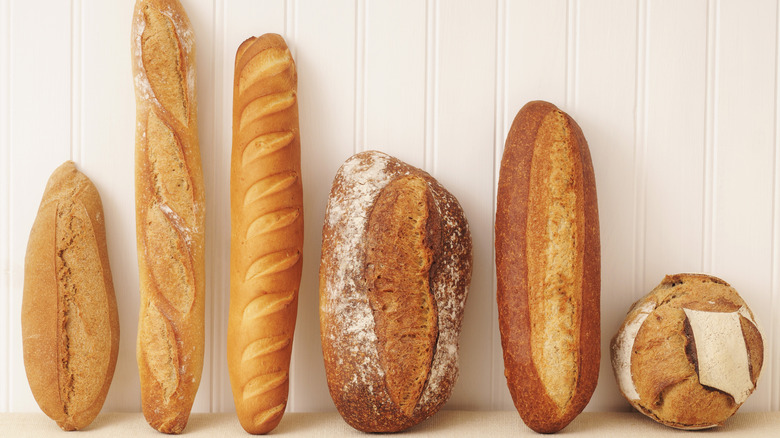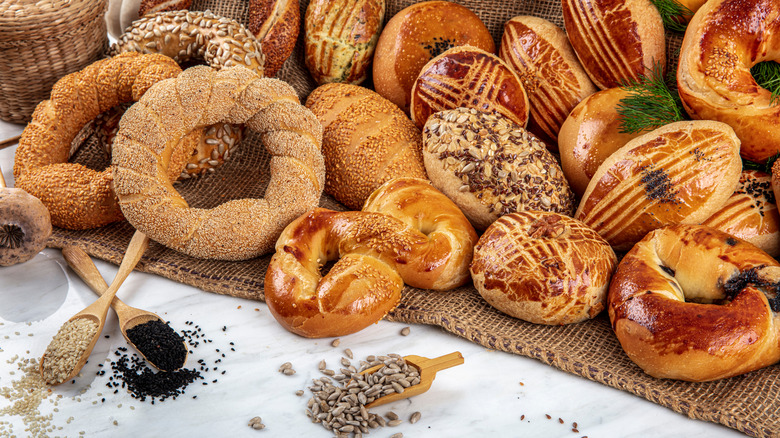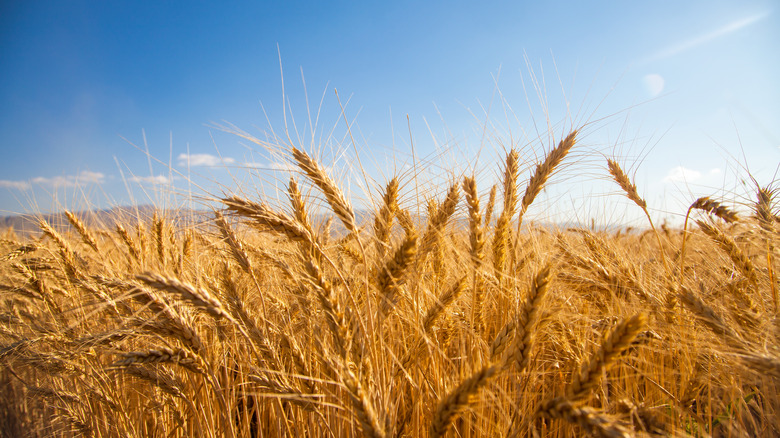The Country That Eats The Most Bread By A Landslide
It would be safe to say that, in America, we eat a lot of bread. According to World of Statistics, each American consumes 17 kilograms (a little over 37 pounds) of bread every year. But, the United States happens to be among the bottom 10 countries in the world when it comes to the amount of bread people eat in total. It's around the same for notorious carb-lovers in France who consume 50 kilos (about 110 pounds) and fellow bread lovers in Italy that enjoy 44 kilos (97 pounds) per year. Surprisingly, the country that eats the most bread is Turkey where citizens eat a whopping 199.6 kilograms or 440 pounds of bread per year.
Another surprise is that China, with its population exceeding 1.4 billion people, comes in at around just 5.83 kilograms (almost 13 pounds) of bread per capita per year, and the second most populated country in the world, India, eats the least amount of bread, coming in a 1.75 kilos (or almost four pounds per person) per year.
Serbia consumes the second highest amount with 135 kilograms (297 pounds) of bread eaten per person on an annual basis, though still a far cry from the amount enjoyed in Turkey. Rounding out the top five are Bulgaria, Ukraine, and Cyprus.
Types of bread in Turkey
In Turkey, bread is called ekmek, and it's an important part of both Turkish food and culture. Breads are enjoyed as street foods and are almost always a part of meals, ideal for picking up bits of food and scraping up sauces. Somun is arguably the most common and popular type of Turkish bread loaf. It is a white bread that is long and tapered at the ends. Another popular type is Vakfikebir, a round sourdough loaf baked in wood ovens that comes from an area near the Black Sea. Just like in America, cornbread is popular in Turkey as well, but it's called misir ekmek and is often flavored with things like herbs, cheese, and anchovies.
Pide bread is a long, oblong-shaped flatbread that is eaten with soups. Another flatbread is Ramazan Pidesi and it is often enjoyed at Ramadan when it is placed on tables for families to tear off pieces and share together. Bazlama is a flat bread that is treated like sandwich bread, filled with meat and cheese and made into a simple lunch. Lavas and balloon bread are also used make wrap sandwiches, encase kebab meat, and serve with mezze. There's also a popular street food in Turkey called Simit, which resembles a round bagel with a large hole in the middle. Simit is covered with sesame seeds and dipped in molasses before it is baked; you'll find people eating this treat at all times of the day in Turkey.
In America, Turkish bakeries aren't as plentiful as Italian or French bakeries, but look for them in larger cities. Mediterranean bakeries sometimes offer a variety of Turkish baked goods as well.
Turkey has been growing wheat since ancient times
Wheat has a long history in Turkey and the region of Anatolia, also known as Asia Minor. Here, the grain is treated with great fervency as a food source, religious symbol, and celebration element. Wheat and ancient grains have been plentiful in this region for thousands of years, making Anatolia and Turkey known as a vital area for the production of breads. Even as the population of the country has wavered and wheat production has dwindled, the yearly consumption of bread remains much higher here than anywhere else in the world.
One factor that could contribute to this is that, in Turkey, bread is eaten with every meal — breakfast, lunch, and dinner — leading to a high number of bakeries in the country that don't just bake up fresh loaves early in the morning, but all day long. Bread is considered vital for every person, rich or poor, in this country, making it an element that brings citizens together. In fact, it's common to see bags of leftover bread hanging outside homes for poor citizens to take if they are hungry.
Bread is actually subsidized by the Turkish government, meaning prices are determined by state-owned bakeries, but, at the same time, private bakeries are allowed to set their own prices. Every single town in Turkey has at least one bakery making it that much easier for the country to keep its bread-eating status.



